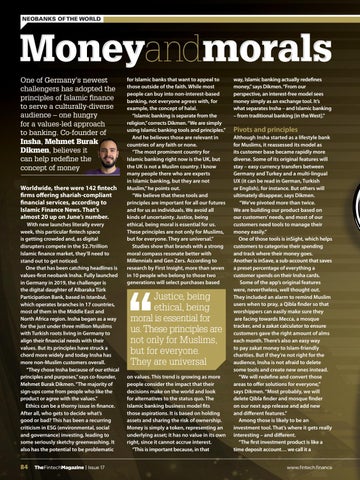NEOBANKS OF THE WORLD
One of Germany’s newest challengers has adopted the principles of Islamic finance to serve a culturally-diverse audience – one hungry for a values-led approach to banking. Co-founder of Insha, Mehmet Burak Dikmen, believes it can help redefine the concept of money Worldwide, there were 142 fintech firms offering shariah-compliant financial services, according to Islamic Finance News. That’s almost 20 up on June’s number. With new launches literally every week, this particular fintech space is getting crowded and, as digital disrupters compete in the $2.7trillion Islamic finance market, they’ll need to stand out to get noticed. One that has been catching headlines is values-first neobank Insha. Fully launched in Germany in 2019, the challenger is the digital daughter of Albaraka Türk Participation Bank, based in Istanbul, which operates branches in 17 countries, most of them in the Middle East and North Africa region. Insha began as a way for the just under three million Muslims with Turkish roots living in Germany to align their financial needs with their values. But its principles have struck a chord more widely and today Insha has more non-Muslim customers overall. “They chose Insha because of our ethical principles and purposes,” says co-founder, Mehmet Burak Dikmen. “The majority of sign-ups come from people who like the product or agree with the values.” Ethics can be a thorny issue in finance. After all, who gets to decide what’s good or bad? This has been a recurring criticism in ESG (environmental, social and governance) investing, leading to some seriously sketchy greenwashing. It also has the potential to be problematic
84
TheFintechMagazine | Issue 17
for Islamic banks that want to appeal to those outside of the faith. While most people can buy into non-interest-based banking, not everyone agrees with, for example, the concept of halal. “Islamic banking is separate from the religion,” corrects Dikmen. “We are simply using Islamic banking tools and principles.” And he believes those are relevant in countries of any faith or none. “The most prominent country for Islamic banking right now is the UK, but the UK is not a Muslim country. I know many people there who are experts in Islamic banking, but they are not Muslim,” he points out. “We believe that these tools and principles are important for all our futures and for us as individuals. We avoid all kinds of uncertainty. Justice, being ethical, being moral is essential for us. These principles are not only for Muslims, but for everyone. They are universal.” Studies show that brands with a strong moral compass resonate better with Millennials and Gen Zers. According to research by First Insight, more than seven in 10 people who belong to those two generations will select purchases based
Justice, being ethical, being moral is essential for us. These principles are not only for Muslims, but for everyone. They are universal on values. This trend is growing as more people consider the impact that their decisions make on the world and look for alternatives to the status quo. The Islamic banking business model fits those aspirations. It is based on holding assets and sharing the risk of ownership. Money is simply a token, representing an underlying asset; it has no value in its own right, since it cannot accrue interest. “This is important because, in that
way, Islamic banking actually redefines money,” says Dikmen. “From our perspective, an interest-free model sees money simply as an exchange tool. It’s what separates Insha – and Islamic banking – from traditional banking [in the West].”
Pivots and principles Although Insha started as a lifestyle bank for Muslims, it reassessed its model as its customer base became rapidly more diverse. Some of its original features will stay – easy currency transfers between Germany and Turkey and a multi-lingual UX (it can be read in German, Turkish or English), for instance. But others will ultimately disappear, says Dikmen. “We’ve pivoted more than twice. We are building our product based on our customers’ needs, and most of our customers need tools to manage their money easily.” One of those tools is inSight, which helps customers to categorise their spending and track where their money goes. Another is inSave, a sub-account that saves a preset percentage of everything a customer spends on their Insha cards. Some of the app’s original features were, nevertheless, well thought out. They included an alarm to remind Muslim users when to pray, a Qibla finder so that worshippers can easily make sure they are facing towards Mecca, a mosque tracker, and a zakat calculator to ensure customers gave the right amount of alms each month. There’s also an easy way to pay zakat money to Islam-friendly charities. But if they’re not right for the audience, Insha is not afraid to delete some tools and create new ones instead. “We will redefine and convert those areas to offer solutions for everyone,” says Dikmen. “Most probably, we will delete Qibla finder and mosque finder on our next app release and add new and different features.” Among those is likely to be an investment tool. That’s where it gets really interesting – and different. “The first investment product is like a time deposit account… we call it a www.fintech.finance
